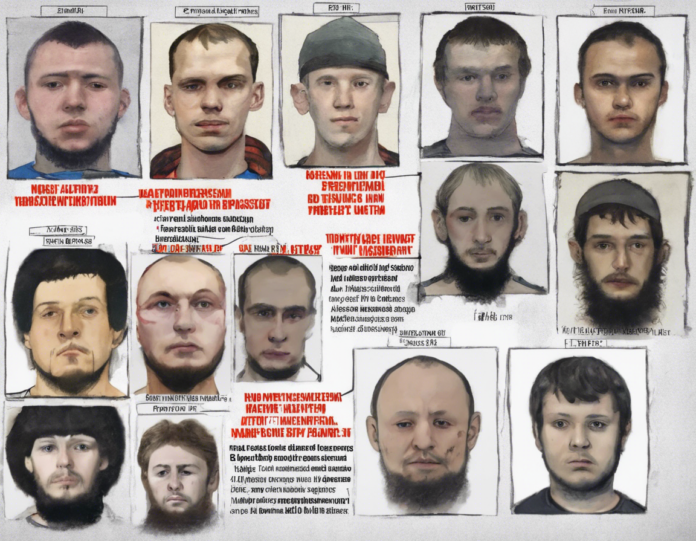Recently, the world has been shaken by numerous terror incidents that have occurred in various parts of the globe. Many of these incidents have been linked to individuals or groups with ties to extremist ideologies, including those stemming from Russia. In this article, we will delve into the world of Russian terror suspects to gain a better understanding of who these individuals are, what motivates them, and how authorities are working to combat these threats.
Understanding Russian Terror Suspects
Who Are Russian Terror Suspects?
Russian terror suspects refer to individuals who are believed to have connections to or sympathies with extremist groups or ideologies that promote violence, terrorism, or other criminal activities. These suspects may have been involved in planning or carrying out attacks, recruiting others to join their cause, or providing support to terrorist organizations.
What Motivates Russian Terror Suspects?
The motivations behind Russian terror suspects can vary widely, but some common factors include ideological beliefs, grievances against the government or society, a sense of alienation or marginalization, financial incentives, or a desire for power and recognition within extremist circles. Radicalization through online propaganda and recruitment efforts by extremist groups also play a significant role in shaping the beliefs and actions of these individuals.
Identifying and Combating Russian Terror Suspects
How Are Russian Terror Suspects Identified?
Law enforcement and intelligence agencies use a variety of methods to identify and track Russian terror suspects, including surveillance, monitoring online communications, analyzing travel patterns, conducting interviews with associates, and gathering intelligence from informants. Advanced technologies, such as facial recognition software and social media monitoring tools, are also used to aid in the identification process.
What Measures Are Taken to Combat Russian Terror Suspects?
Authorities employ a range of counterterrorism measures to combat the threat posed by Russian terror suspects, including increased security at potential targets, intelligence sharing with international partners, disrupting terrorist networks through arrests and prosecutions, preventing radicalization through community outreach programs, and implementing deradicalization initiatives for individuals at risk of extremism. Additionally, efforts to address the root causes of terrorism, such as poverty, social inequality, and political grievances, are crucial in preventing radicalization and addressing the underlying issues that fuel extremist ideologies.
Challenges and Implications
What Challenges Do Authorities Face in Dealing with Russian Terror Suspects?
Dealing with Russian terror suspects presents numerous challenges for authorities, including the need to balance national security concerns with protecting civil liberties, navigating complex legal frameworks for prosecuting terrorism cases, countering online radicalization efforts, addressing foreign fighters returning from conflict zones, and adapting to evolving tactics and strategies used by extremist groups. The transnational nature of terrorism also complicates efforts to combat the threat posed by Russian terror suspects, as they may have connections to networks operating in other countries.
What Are the Implications of Failing to Address the Threat Posed by Russian Terror Suspects?
Failing to address the threat posed by Russian terror suspects can have serious implications for national security, public safety, and global stability. Terrorist attacks carried out by individuals with ties to Russia can lead to loss of life, widespread fear and panic, economic disruptions, and damage to critical infrastructure. Moreover, the spread of extremist ideologies can fuel further radicalization and recruitment, perpetuating a cycle of violence and instability. It is essential for authorities to remain vigilant and proactive in combating the threat posed by Russian terror suspects to safeguard the security and well-being of their citizens.
Frequently Asked Questions (FAQs)
1. What are the most common extremist ideologies espoused by Russian terror suspects?
– Russian terror suspects may be motivated by ideologies such as white supremacy, neo-Nazism, Islamist extremism, separatism, or anarchism. These ideologies can influence their beliefs and actions, leading to acts of violence and terrorism.
2. How do Russian authorities cooperate with international partners to combat the threat of terrorism?
– Russian authorities participate in bilateral and multilateral initiatives with other countries to share intelligence, coordinate counterterrorism operations, conduct joint investigations, and exchange best practices in preventing and countering terrorism.
3. What role does social media play in the radicalization of Russian terror suspects?
– Social media platforms are used by extremist groups to disseminate propaganda, recruit followers, spread hate speech, and glorify acts of violence. Russian terror suspects may be radicalized through online interactions with like-minded individuals or exposure to extremist content.
4. Are there any specific recruitment tactics used by extremist groups to target Russian individuals?
– Extremist groups may use a variety of tactics to recruit Russian individuals, including online grooming, peer-to-peer indoctrination, offering financial incentives, exploiting personal grievances, presenting a distorted ideology, and providing a sense of belonging and purpose within the group.
5. How do deradicalization programs help rehabilitate and reintegrate Russian individuals who have been involved in extremist activities?
– Deradicalization programs utilize counseling, education, vocational training, psychological support, religious guidance, and community engagement to help rehabilitate and reintegrate individuals who have been radicalized. These programs aim to address the underlying factors that contribute to radicalization and promote a positive pathway away from extremist ideologies.
In conclusion, the threat posed by Russian terror suspects is a complex and multifaceted challenge that requires a comprehensive and coordinated response from authorities, international partners, civil society organizations, and communities. By understanding the motivations behind these individuals, identifying them early, implementing effective counterterrorism measures, addressing root causes of extremism, and promoting deradicalization efforts, we can work towards preventing and countering the spread of terrorism and safeguarding the security of our societies.












